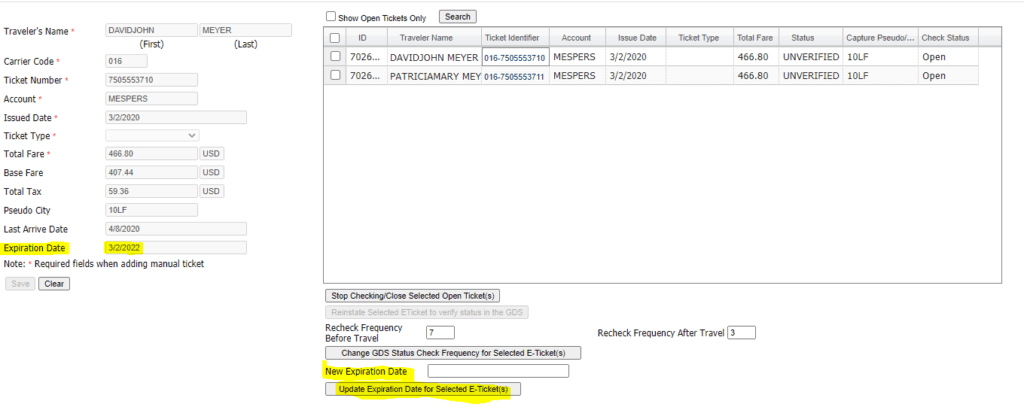
Extended TicketTRAK Expiration Date Functionality
TicketTRAK can track ticket expiration dates based on carrier, policy, or custom inputs.
Ticket expiration dates were far less complicated before COVID struck. Most tickets simply expired one year from their issue date. During COVID, the majority of carriers extended that to two years. Now, as travel recovers, many airlines are revisiting their ticket expiration dates and changing their terms and usage conditions. It’s not so straightforward anymore. That is why we’ve rolled out a new TicketTRAK feature, ticket expiration tracking.
The latest version of TicketTRAK can account for updated airline ticket expiration policies:
- Monitor ticket expiration dates for our key 20 carriers. These airlines account for over 80% of all open tickets
- Set custom expiration dates on your tickets
For details, see below:

TicketTRAK Expiration Dates Product Enhancement
1. TicketTRAK Expiration Date Logic
Initial Product Design (Pre-COVID) was that all E-Ticket Expiration Dates were set to One Year from the Date of Ticket Issuance. This was consistent with Industry Standard Policies. There was No Ability to alter the Expiration Date on E-Tickets since Expiration Dates were standard.
During COVID – Carrier Policies Changed Immediately to Extend Expiration Dates. Cornerstone made a mass database update to extend Expiration Dates to two years and applied both to all existing E-Tickets as well as newly issued E-Tickets processed by TicketTRAK.
NOW: COVID Recovery – Carrier Policies have become fluid and will likely remain fluid for the immediate future. Because of this, the blanket two-year extension is no longer satisfactory. Expiration Date Policies are also not consistent among Carriers anymore, and Carrier Policy Changes affect Expiration Dates for E-Tickets already in TicketTRAK Base.
2. TicketTRAK Solution
There are four parts to the TicketTRAK Solution, presented here as 2a – 2d:
2a. New System Table maintained by Cornerstone
- Currently, we house our Key 20 Carriers‘ Expiration Date Policies based on issue date and/or travel date.
- Additional Carrier Policies will be considered and verified as they become available.
- Our System Table will apply to New E-Tickets captured, or existing PNRs resubmitted to the TicketTRAK module.
Current Policies For The New System Table:
- American Airlines (Updated May 2022)
- Tickets issued between 12/31/2018 and 12/31/2019 for travel between 3/1/2020 and 3/31/2021 expire 3/31/2022
- Tickets issued between 1/1/2020 and 9/30/2021 expire 9/30/2022
- Tickets issued between 10/1/2021 and 12/31/2021 expire 12/31/2022
- Delta Airlines (Updated February 2022)
- Tickets issued between 3/1/2019 and 2/29/2020 expire two years from date of issue
- Tickets issued between 3/1/2020 and 12/31/2022 expire 12/31/2023
- United Airlines
- Tickets issued between 5/1/2019 and 12/31/2021 expire 12/31/2022
- Alaska Airlines (Updated February 2022)
- Tickets issued between 1/1/2020 and 10/31/2020 expire two years from date of issue
- Tickets issued between 11/1/2020 and 4/30/2021 for travel between 2/27/2020 and 3/31/2022 expire 3/31/2022
- Hawaiian Airlines
- Tickets issued between 3/1/2020 and 12/31/2020 expire two years from date of issue
- Tickets issued before 2/29/2020 for travel between 3/1/2020 and 2/28/2021 expire 5/31/2022
- Tickets issued between 1/1/2021 and 12/31/2021 expire 12/31/2022
- Jet Blue
- Tickets issued before 5/31/2020 for travel between 2/27/2020 and 6/30/2020 expire 12/31/2021
- Lufthansa
- Tickets issued between 3/1/2019 and 7/31/2021 for travel between 2/1/2020 and 8/31/2021 expire 7/31/2022
- British Airways (Updated July 2022)
- Tickets issued between 3/1/2019 and 3/2/2020 for travel before 2/28/2021 expire 9/30/2023
- Tickets issued between 3/3/2020 and 6/7/2020 for travel before 9/30/2022 expire 9/30/2023
- Emirates
- Tickets issued before 3/31/2021 for travel before 12/31/2021 expire three years from date of issue
- Tickets issued after 4/1/2021 expire two years from date of issue
- Turkish Airlines
- Tickets issued between 3/21/2020 and 5/20/2020 expire 12/31/2021
- Air Canada
- Tickets issued after 3/1/2019 expire two years from date of issue
- Qatar Airways
- Tickets issued between 3/1/2019 and 8/31/2021 expire two years from date of issue
- Avianca
- Tickets issued before 12/31/2020 expire 12/31/2021
- Copa
- Tickets issued before 8/31/2020 for travel before 6/30/2021 expire 12/31/2021
- Singapore Airlines
- Tickets issued before 3/15/2020 for travel between 1/24/2020 and 3/31/2021 expire 12/31/2021
- Qantas
- Tickets issued before 7/31/2021 expire 12/31/2023
- Malaysia Airlines
- Tickets issued for travel between 1/1/2020 and 10/30/2021 expire 12/31/2022
- Tickets issued for travel between 1/1/2020 and 10/30/2021 expire 12/31/2022
- Garuda Indonesia
- Tickets issued before 7/5/2021 expire 12/31/2023
- Cathay Pacific
- Tickets issued between 3/9/2020 and 12/31/2021 expire 12/31/2022
- Swiss Airlines
- Tickets issued before 7/31/2021 for travel between 2/1/2020 and 8/31/2021 expire 7/31/2022
- Southwest Airlines (Updated August 2022)
- Tickets issued on or after 7/28/2022 DO NOT EXPIRE
- A placeholder of 12/31/9999 will be used to represent “No Expiration Date”
2b. iQCX Portal – TicketTRAK Form – Update Expiration Date
TicketTRAK Clients can update the Expiration Date of E-Tickets using the iQCX Portal TicketTRAK form:

2c. Include Expiration Date in TT/ADD- Remark
- TicketTRAK clients can pass through an expiration date to override TicketTRAK Module Defaults
- There is an optional field after the Ticket Type to store value from the remark:
- TT/ADD-001-2176582549-257.50 USD-02APR21-RECLOC-EXP 02APR22
- When the TT/ADD- contains BOTH RECLOC and -MCO indicator, the -EXP date would not likely fit in one remark. In this case, the secondary TT/ADD- remark would be used for that ticket number:
- Example – carrier granted a few months extension for them to use this MCO issued 3/4/2020:
- TT/ADD-279-5057087099-257.20 USD-04MAR20-RECLOC-MCO
- TT/ADD-279-5057087099-EXP 04SEP21
- Example – carrier granted a few months extension for them to use this MCO issued 3/4/2020:
2d. Update Expiration Data using TT/UPDATE- Remark
The remark will look like this: TT/UPDATE-[carrier]-[tktNumber]-EXP [mm/dd/yyyy]
- Example – TT/UPDATE-006-1234567890-EXP 09/04/2021